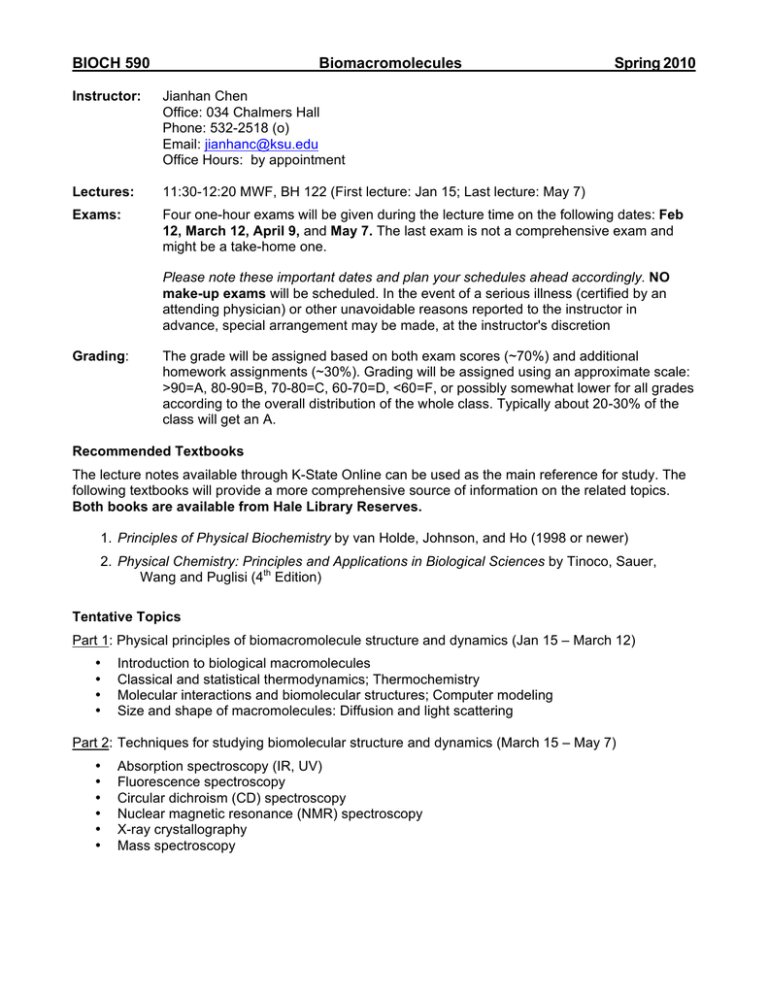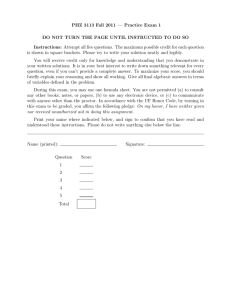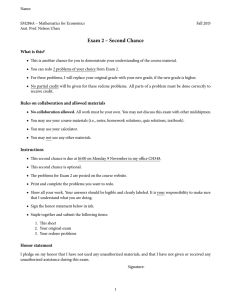BIOCH 590 Biomacromolecules Spring 2010
advertisement

BIOCH 590 Biomacromolecules Spring 2010 Instructor: Jianhan Chen Office: 034 Chalmers Hall Phone: 532-2518 (o) Email: jianhanc@ksu.edu Office Hours: by appointment Lectures: 11:30-12:20 MWF, BH 122 (First lecture: Jan 15; Last lecture: May 7) Exams: Four one-hour exams will be given during the lecture time on the following dates: Feb 12, March 12, April 9, and May 7. The last exam is not a comprehensive exam and might be a take-home one. Please note these important dates and plan your schedules ahead accordingly. NO make-up exams will be scheduled. In the event of a serious illness (certified by an attending physician) or other unavoidable reasons reported to the instructor in advance, special arrangement may be made, at the instructor's discretion Grading: The grade will be assigned based on both exam scores (~70%) and additional homework assignments (~30%). Grading will be assigned using an approximate scale: >90=A, 80-90=B, 70-80=C, 60-70=D, <60=F, or possibly somewhat lower for all grades according to the overall distribution of the whole class. Typically about 20-30% of the class will get an A. Recommended Textbooks The lecture notes available through K-State Online can be used as the main reference for study. The following textbooks will provide a more comprehensive source of information on the related topics. Both books are available from Hale Library Reserves. 1. Principles of Physical Biochemistry by van Holde, Johnson, and Ho (1998 or newer) 2. Physical Chemistry: Principles and Applications in Biological Sciences by Tinoco, Sauer, Wang and Puglisi (4th Edition) Tentative Topics Part 1: Physical principles of biomacromolecule structure and dynamics (Jan 15 – March 12) • • • • Introduction to biological macromolecules Classical and statistical thermodynamics; Thermochemistry Molecular interactions and biomolecular structures; Computer modeling Size and shape of macromolecules: Diffusion and light scattering Part 2: Techniques for studying biomolecular structure and dynamics (March 15 – May 7) • • • • • • Absorption spectroscopy (IR, UV) Fluorescence spectroscopy Circular dichroism (CD) spectroscopy Nuclear magnetic resonance (NMR) spectroscopy X-ray crystallography Mass spectroscopy BIOCH 590 Biomacromolecules Spring 2010 Important Notes 1, Kansas State University has an Honor System based on personal integrity, which is presumed to be sufficient assurance that, in academic matters, one's work is performed honestly and without unauthorized assistance. Undergraduate and graduate students, by registration, acknowledge the jurisdiction of the Honor System. The policies and procedures of the Honor System apply to all full and part-time students enrolled in undergraduate and graduate courses on-campus, off-campus, and via distance learning. The honor system website can be reached via the following URL: www.ksu.edu/honor . A component vital to the Honor System is the inclusion of the Honor Pledge which applies to all assignments, examinations, or other course work undertaken by students. The Honor Pledge is implied, whether or not it is stated: "On my honor, as a student, I have neither given nor received unauthorized aid on this academic work." A grade of XF can result from a breach of academic honesty. The F indicates failure in the course; the X indicates the reason is an Honor Pledge violation. 2. Any student with a disability who needs a classroom accommodation, access to technology or other assistance in this course should contact Disability Support Services and/or the instructor." 3. All student activities in the University, including this course, are governed by the Student Judicial Conduct Code as outlined in the Student Governing Association By Laws, Article VI, Section 3, number 2. Students who engage in behavior that disrupts the learning environment may be asked to leave the class.



